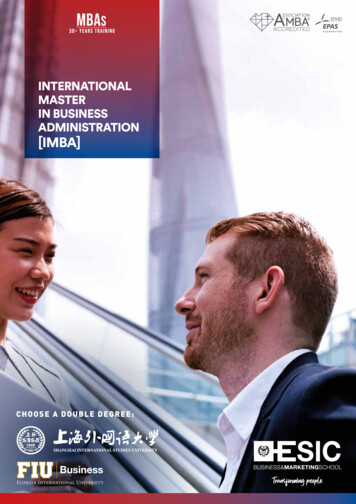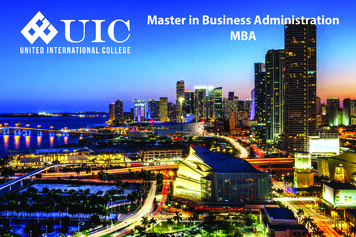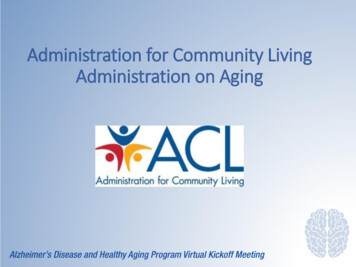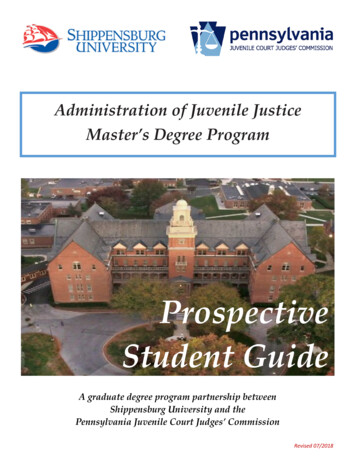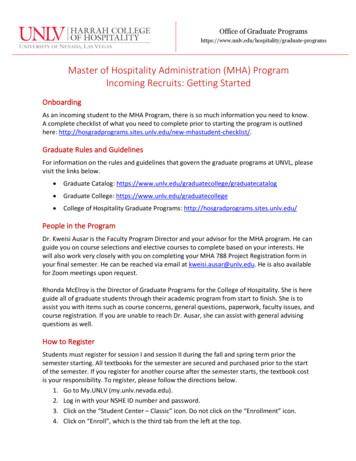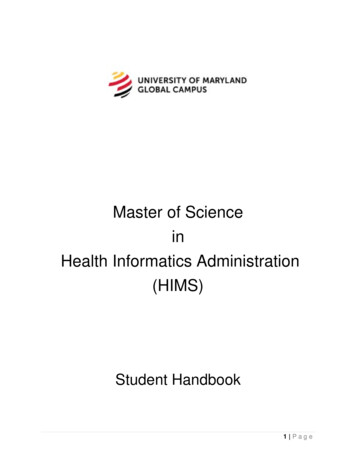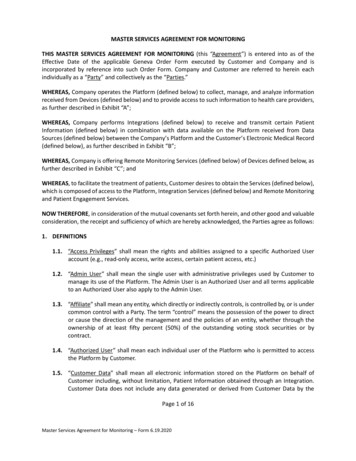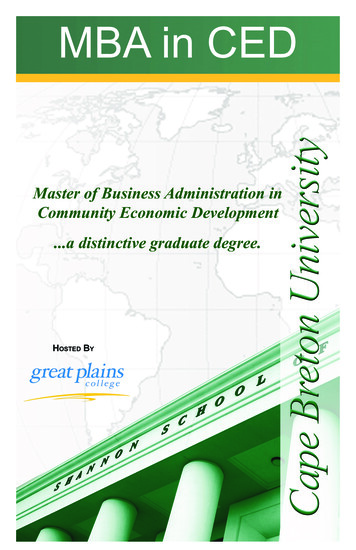
Transcription
MBA in CEDMaster of Business Administration inCommunity Economic Development.a distinctive graduate degree.Hosted By
One of a KindCape Breton University’s MBA in Community Economic Developmentis the only MBA program in the Americas that aims to deliver advancedbusiness knowledge and skills in the context of the community and theworld. The MBA in CED offers a leading edge curriculum that includes allbusiness subjects found in traditional MBA programs, and it also coverseconomic development, leadership, governance and management ofchange.This program is designed for learners who aspire to play leadership rolesin the public sector, in Third sector organizations, and in communityminded businesses. The MBA in CED aims to develop a new generationof leaders who have strong business management capabilities, welldeveloped collaborative and interpersonal skills, and deep knowledgeof accountability, social responsibility, and development issues andpractices. Graduates are equipped with the knowledge and skills tomake a difference in leading organizations in an increasingly globalcommunity and economy.The needs of society are always changing and CBU’s size andgovernance structure enables us to adapt curriculum in a timely fashionto meet the evolving requirements of learners and organizations. Thespecial appeal of the MBA in CED is evidenced by the demand forthis program in different parts of Canada. Besides the CBU campusin Sydney NS, the MBA in CED program is also being delivered inEdmonton, AB, in Kingston and Sault Ste. Marie, ON and Saskatoon, SK.The ProgramThe MBA in CED offers a leading edge business curriculum designedto foster capacities of analysis, critical thinking, problem solving, andcommunication. It embraces concepts of diversity and interdependencyand equips students with the knowledge base and skills to functioneffectively and productively in an increasingly global community.Students must complete the required 15 three-credit courses plus amajor research essay/case study, and thus earn 48 credits.MBAC 5101MBAC 5103MBAC 5104MBAC 5105MBAC 5107MBAC 6101MBAC 6103MBAC 6107MBAC 6124MBAC ElectiveMBAC 6106MBAC 6118MBAC 6121MBAC 6125MBAC ElectiveMBAC 6801ResearchEssay/ CaseStudyStudents will be required to maintain a 3.0 Grade Point Average (GPA)on a 4.0 scale (70% average) to remain in the program.Enrolment is limited to 20 students per cohort.
Admission RequirementsTo meet MBA in CED Standard Admission Requirements a bachelor’sdegree from a recognized university is required. The application cannot beprocessed until all of the following documents and fee have been received:· a completed application form, with a non-refundable application fee· official transcripts for all previous academic study· a resume detailing employment experience, skills, communityinvolvement, and interests· a 500-800 word statement on desire to enter the program· three references, preferably including one professional and oneacademic· satisfactory scores on the GMAT*· satisfactory scores on the TOEFL/IELTS (for students whose nativelanguage is not English)· satisfactory performance in an interviewCandidates who do not have an undergraduate degree, and show potentialfor success in graduate level study, may be admitted to the MBA in CED asa non-traditional student. Outstanding career and/or volunteer experienceare expected. The candidates will be assessed individually in such areasas experience and performance in a number of education/training courses.Applicants must provide:· a completed application form, with a non-refundable application fee· proof of a minimum of three years experience in managerial/decisionmaking positions· official copy of a high school diploma or equivalent academic credential· official transcripts of completed undergraduate work· a resume detailing employment experience, skills, communityinvolvement, and interests· three references, preferably including one professional and oneacademic· a four to six page essay outlining desire to enter the program,community involvement, and what can be offered to other students inthe classroom· satisfactory scores on the GMAT*· satisfactory scores on the TOEFL/IELTS (for students whose nativelanguage is not English)· satisfactory performance in an interviewReference letters must be originals, sent directly by the referees. Onlyofficial transcripts sent by the Registrar of the issuing institution will beaccepted. The Educational Testing Service must forward GMAT andTOEFL/IELTS score reports. Photocopies of any of these documents willnot be accepted.*Satisfactory scores on the GMAT or high communication and analytical skills evidencedby B academic performance in an accredited North American degree program thatincluded both qualitative and quantitative subjects. Senior, experienced managers, whocompleted their primary and secondary education in Canada and show potential for successin a graduate program, may also qualify for a waiver of the GMAT.
Advanced StandingThe MBA in CED maximizes accessibility to graduate education throughPrior Learning Assessment (PLA). Recognition of past learning andcareer knowledge and skills through PLA are assessed on an individualbasis.DeliveryCourses will be delivered on alternate weekends, in face-to-faceclasses on site in the Saskatoon area, and other locations dependingon demand. All courses will be delivered on-site in Saskatchewan andstudents do not have to attend any core courses at CBU’s main campus.Weekend FormatFriday 9:00AM - 5:00PMSaturday 9:00AM - 5:00PMLearners can complete all courses over 22 months by attending classesin Saskatchewan on alternate weekends. Learners who miss a coursehave the option to take the course at CBU’s campus in Cape Bretonover two weeks in July.Course DescriptionsEach course is 3 credits.MBAC 5101 Business and Community Development IProvides the theoretical and philosophical foundations of community economicdevelopment, identifying business as a way of achieving an enhanced quality of communitylife. Students are introduced to the language and concept of “Third Sector” structures suchas community development corporations, worker-owned ventures,and similar initiatives.MBAC 5103 Fundamentals of Accounting: Applications to CEDA combination of financial and managerial accounting themes designed particularly forthose working in a CED environment. We next focus on accounting from a “manager’s”decision-making point of view; that is, as a person interpreting rather than preparing thesestatements. Issues relating to cash flow management, budgeting and relevant costs will bediscussed.MBAC 5104 Fundamentals of Marketing: The CED ApproachThe purpose of this course is to present the marketing dimensions as they apply tocommunity and social organizations. It deals with both the strategic and tactical approachesto influencing behaviour in a wide range of key target markets, such as customers, clients,funding sources, policy makers, volunteers, the media and the organization’s own staff. Thecommunity venture will be examined through the basic concept of the marketing mix.MBAC 5105 Organizational Behaviour: Management and Policy-MakingThe course presents the history, theory, models, and research in several topics inorganization behaviour and organization design, including strategic human resourceplanning. Class discussions, exercises, and cases will be used to reinforce concepts andimprove skills required in managing and motivating people.
MBAC 5107 Economic Geography and DevelopmentIntroduces students to the analytic tools that economic geographers use to measureand compare spatial variations in economic growth. The course describes the dominanteconomic mechanisms and processes of uneven development that produce global cities,peripheral regions, and regional economies. Students will employ this background to studythe attributes of a depleted community and to assess its potential for economic recovery.MBAC 6101 Business and Community Development IIThis practical course will explore the relationship of business with the community, and thechallenges and issues surrounding community-based business institutions. This topic willbe explored through the assigned readings, case studies and class discussion. The coursewill seek to draw from theories of CED and the social economy and compare them toexamples of how community business and CED gets implemented.MBAC 6103 Fundamentals of Finance: Applications to CEDProvides students with a comprehensive body of knowledge concerning management ofthe firm’s financial affairs. The course covers financial analysis and planning, valuation ofassets, longterm capital budgeting and capital structure decisions, short-term investmentand financing decisions, and tax principles influencing the organization’s finance andinvestment decisions.MBAC 6106 Community Organization and Leadership Training TechniquesThe course uses a combination of lectures, discussions, cases and presentations to focuson leadership training techniques. It covers major issues in leadership, and presentspractical techniques for implementation. Learners will be able to analyze typical leadershipproblems and develop options for solutions, including means for conflict resolution andmediation. Emphasis is placed on cultural and political differences in the conduct ofcommunity organization and leadership training, and their effect on outcomes.MBAC 6107 Comparative DevelopmentThis course employs a comparative approach in the assessment of alternative developmentphilosophies in both the North and South, especially those which attempt to define asustainable community. It examines the influence of natural resources and governance ondevelopment, it synthesizes concepts of development, and it examines strategies usedto formulate action plans to achieve sustainability in communities. Learners will becomeskilled in thinking globally and acting locally, and on using qualitative and quantitativeindicators of sustainability.MBAC 6118 Fundamentals of Venture Analysis: The CED ContextThe course provides students with opportunities to apply knowledge acquired in priorexperience and other business courses, in planning and developing a business venture.Students who complete this course will have a sound understanding of the process ofdeveloping a business plan, and will be able to evaluate business plans. The coursewill also attempt to explore the differences between traditional business practice andcommunity economic development.MBAC 6121 Applied Research MethodsThis survey course will provide students with an understanding of varying approaches toapplied research, including qualitative, quantitative, and ethnographic methods. Learnerswill be required to analyze critically the strengths and weaknesses of the methods.Participants will be encouraged to prepare their proposal for their major research essay andidentify research methods appropriate to their research project.
MBAC 6124 International BusinessThis course focuses on the issues raised by doing business internationally. It examinesthe economic and financial environment, institutions and markets, and interrelationshipsof principal trade centres. It also discusses trade issues and strategic internationalmanagement issues. The course is integrated across business functional areas.MBAC 6125 Strategic ManagementIntroduces students to the basic concepts and methodologies used in crafting andexecuting business strategy. The course provides the student with the opportunity to applyknowledge garnered in previous courses and to integrate it. Will use the case methodextensively and will focus on strategic decision making in the CED context.MBAC Elective (can be substituted by the first and second course of adesignated stream)MBAC 6801 Applied Research ProjectThe applied research project will approach a problem in economicdevelopment in a holistic, multidisciplinary manner and will meet thehighest academic standards. Students will ground their research in anexisting or planned development initiative. A two person supervisorycommittee, drawn from different disciplines, will oversee the preparationof this essay. There is no residency requirement for the research project,which will be completed off site. The applied research project must becompleted within one calendar year.oPtionsStudents pursuing an Option would substitute the first course of thedesignated Option for the first MBAC Elective and the second courseof the designated Option for the second MBAC Elective. MBAC 6801Applied Research Project would build on courses within the Option.Strategic Leadership Option:MBAC 6219 Social Dynamics of LeadershipMBAC 6233 Contemporary Topics: Change Management andGovernanceFirst Nations Option:MBAC 6209 Land Claims, Self-government and Planning for CommunityEconomic Development in First Nations CommunitiesMBAC 6211 The Dynamics of Community Economic Development inUrban and Rural First Nations CommunitiesPeace-Building, Reconstruction and Good Governance Option:MBAC 6215 Emergency ManagementMBAC 6217 Conflict Resolution and Community ReconstructionInternational Business Option:MBAC 6226 International FinanceMBAC 6228 International Marketing
2017- 2018 tuition and fees (sasKatcHeWan coHorts)**Note that prices are subject to changeCanadian and Landed Immigrants: 2082 (per 3 credit course)TuitionApplication Fee: 85 (one-time, non-refundable fee)Program Fee: 415 (one-time, non-refundable fee)“The onsite delivery over 24 months was extremely convenient allowing me to continue working full-time while pursuing my degree.”Kent McMann, MBA in CED’11General Manager, Foam Lake Savings & Credit Union“The First Nations Option fit my needs and interests as a student, aMi’kmaq, and a professional working in the field of community economic development.”Mary Beth Doucette, MBA in CED’08Industrial Engineer, Membertou First Nation 17,500 SSHRC Award Recipient“It took me several years to find a master’s level program that wouldfulfill both my personal and professional needs. I could study full timewhile working full time; I did not have to juggle my work schedule, as itwas offered on weekends. It was offered face-to-face and its coursesfocused on people and community, and social enterprises. It acknowledged the role of global corporations, but it also offered opportunity tocritically reflect on that role. By putting people into the equation, offering courses in leadership, social marketing, comparative development this MBA provided me with a new perspective on the world in whichwe live. In the first evening of my first course, I knew that I made theright decision; I chose the right program.”Heather D. Wheeliker, MBA in CED ‘10Director, Community and Employee EngagementOffice of Environment, City of Edmonton“The MBA in CED gave me the opportunity to study an extensiverange of business subjects while working alongside individuals fromvarious backgrounds. The program has given me the tools to succeedin today’s rapidly changing global economy. The residential formatwas extremely convenient allowing me to continue working full-timewhile learning.”Jim Marsden, MBA in CED ‘04Professional Development CoordinatorContinuous Learning, College of the North Atlantic
Enable Your Career“The goal of Cape Breton University’s MBA in CED program isto develop a new generation of leaders who are skilled to makedecisions that not only advance their organizations, but alsoaffect positively the community and the environment”George KaraphillisDirector, MBA in CED programCape Breton University & CED: An Important BlendCape Breton University, since its inception, has held a consistent focuson the region’s economic and cultural growth. For many years, CapeBreton University has maintained: strong support for its CED expertise from community developmentorganizations, local and federal government agencies; and an established national and international reputation in CED.The strength of the School of Business and Cape Breton University’sstrong community commitment make for a powerful combination ofcourses: ethics and values studies, communication and economicdevelopment.The School of Business pursues affiliations with leading educationalinstitutions to leverage partnerships across Canada and abroad to createsignificant joint opportunities for student education and faculty research.Cape Breton University takes great pride in its special partnership withthe peoples and cultures of an increasingly global community.For more information contact:Director, MBA in CED ProgramSchool of BusinessCape Breton UniversityPO Box 5300Sydney, Nova ScotiaCanada B1P 6L2Hosted ByTel: 902-563-1467Fax: 902-562-0075E-mail: mba@cbu.cawww.cbu.ca/mbaLeaders for a Changing World
Cape Breton University’s MBA in Community Economic Development is the only MBA program in the Americas that aims to deliver advanced business knowledge and skills in the context of the community and the world. The MBA in CED offers a leading edge curriculum that includes all business subje
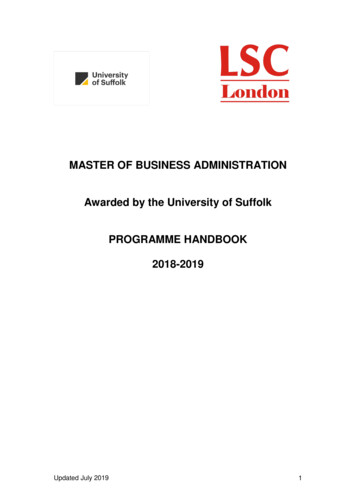

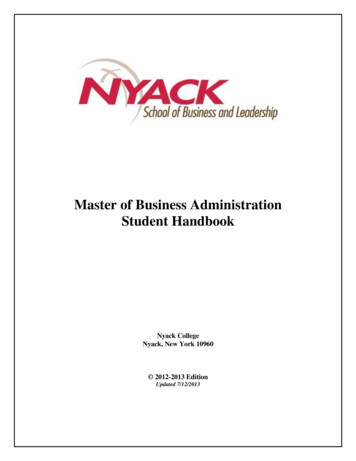
![GLOBAL MASTER IN BUSINESS ADMINISTRATION [GMBA]](/img/9/cat-p-192-i.jpg)
